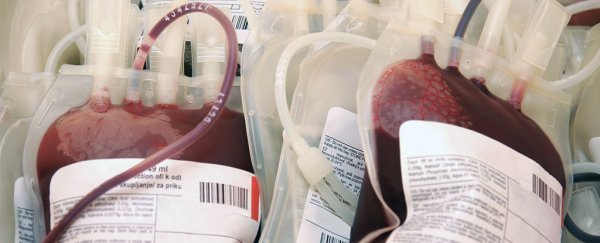In July last year, the American Red Cross declared an emergency blood shortage - it simply wasn't receiving enough donations to help all the patients that needed blood.
Now, researchers from the University of British Columbia may have found a way to address the problem, even if people aren't donating more: convert a less-usable blood type into one that anyone can receive.
Last August, they presented their research at a meeting of the American Chemical Society, and now the results have been published in the journal Nature Microbiology.
Blood types are different because of the sugars on the surface of the red blood cells the body creates. Type A has one type of sugar and Type B has another; Type AB has both sugars. Type O doesn't have any sugars.
If a person receives a blood transfusion of a blood type that's not their own, their immune system will attack and kill the donated blood cells.
For example, a person with Type A blood could never receive a Type B donation because their system would simply reject the new blood because the sugars aren't quite right.
Because Type O blood doesn't carry any sugars, anyone can receive it - it's the universally accepted blood type and, therefore, highly desirable.
In the past, researchers figured out that certain enzymes (molecules that cause chemical reactions) could remove the sugars from A, B, and AB blood cells, converting them into the more useful Type O.
However, as researcher Stephen Withers noted in a press release, they hadn't yet discovered an enzyme that was efficient, safe, and economical. Their search for that enzyme took them into the human gut.
Withers and his team already knew that the lining of the digestive tract contained the same sugars found on blood cells, and that bacterial enzymes within human feces stripped those sugars from the lining to power digestion.
Using this knowledge, the researchers were able to isolate an enzyme that strips the sugars from A and B blood types, transforming them into Type O 30 times more efficiently than any previously discovered enzyme.
For now the researchers are double-checking their findings. The next step would then be to test the enzyme in a clinical setting, which will help determine if the conversion process produces any unintended consequences.
All that extra testing could still take some time. But Withers is optimistic that his team's enzyme could be just the breakthrough we need to ensure anyone who needs a blood donation in the future will be able to receive one.
A version of this article was originally published in August 2018.
This article was originally published by Futurism. Read the original article.
